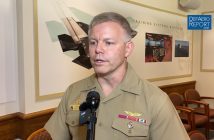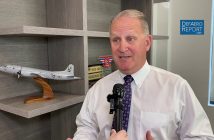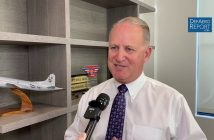Will Roper, PhD, the assistant secretary of the Air Force for acquisition, logistics and technology, discusses the first ever Pitch Day in New York City on March 6, 2019, during which he and Gen. Stephen “Seve” Wilson, USAF, the Air Force vice chief, will assess some 300 innovative proposals as well as an update on efforts to slash 100 years off acquisition programs with Defense & Aerospace Report Editor Vago Muradian. The interview was conducted at the Air Force Association’s 2019 Air Warfare Symposium in Orlando where our coverage was sponsored by L3 Technologies and Leonardo DRS.
Vago Muradian: Welcome to the Defense and Aerospace Report. I’m Vago Muradian here in Orlando, Florida covering the Air Force Association’s Annual Air Warfare Symposium, the number one winter gathering of U.S. Air Force leaders from around the world, as well as industry executives, media and thought leaders. Our coverage here is sponsored by Leonardo DRS and L3 Technologies.
And we’re continuing our conversation with the Acquisition Chief of the United States Air Force, Dr. Will Roper. You were the head of the Strategic Capabilities Office which was developing remarkably low cost and different ways fielding capabilities. So you were a first-rung innovator in that process.
Talk to us a little bit about the Pitch Day next week. It’s going to be in New York. Three hundred folks are going to be presenting to you and to Seve Wilson, the Vice Chief. We had an opportunity to talk wit him yesterday on that.
Why are opportunities like this important? Because there are some folks who are saying well, you know, this is more sort of kabuki; that the Air Force wants to show itself as being open. Talk to us about why these kinds of things are important from your standpoint, given that you’ve seen more innovative proposals than almost anybody else I know.
Dr. Will Roper: The criticism I welcome, because if you’re not having criticism, you’re probably not doing anything worth talking about. So I think Pitch Day’s going to be the first of something that’s going to be a big shift in the Air Force.
It’s the first step. I don’t want to over-talk it, but consider it the first time we’re going to be able to put companies on contract at the speed of need in this century. And that is not waiting two or three months for another transaction agreement. We call that fast in the department. That is slow in the startup world. So the ability to do a contract in one day makes us a player in the world of investments for startups. It allows us to buy ideas in addition to goods and services.
Mr. Muradian: You become a real venture capitalist at that point.
Dr. Roper: We can. I mean we won’t be investing in companies, but by putting them on contract to work on problems, we become a de facto investor. And in the world of venture capitalism, investments from one party often end up resulting in investments from others, so our money could multiply.
So this is really part of an initiative to start growing the industry base again. Some people will think that’s impossible, and I don’t think it is. We have over $660 million in small business innovative research, and billions of dollars in our small business set-asides. So why don’t we think of that as strategic money? Small business is almost pejorative in sound. Why don’t we think of that as strategic business? Of growing the portfolio. I don’t know who the next Amazon or Google is going to be, but they’re a small company right now so I would like them working with the Air Force, to have a connection with us and to have their technology influenced by us.
That being said, Pitch Day is not perfect. We’ve learned a lot about how to make the submission process be easier. We’re going to be working on getting around some of the databasing issues like the Sands and the Dunes databases that we know are frustrating. But what we wanted to demonstrate is that we can rip down the barriers to getting on contract immediately and the ability to put companies on contract with a credit card is no small thing. Because after you get your phase one award, which is 150K, the phase two awards, which move up into the million dollar arena are normally one lump sum contract that you get way too late from the government. We can now change that into monthly installment payments via credit card. So cash flow matters a lot to a small business.
Mr. Muradian: Tell me about it.
Dr. Roper: So we’ve got to start thinking and training our work force to think like those small innovators and know what they value so it’s easy to work with us.
So I predict that after we get past this Pitch Day we’ll do others across the country, and we’re working on the idea of tech incubators as well. So not just putting small businesses on contract, but having brick and mortar that are facilitated by a city or a university where Air Force money is there to take companies through a graduated process to grow while solving our problems.
So innovation is now outside the government, Vago. I mean we can’t create laboratories that have high walls and hope that we’re going to innovate and be superior. We’ve got to get our money out in the world and make partnering with us easy.
Mr. Muradian: Twenty years from now I don’t want you to be in a position like Mark Cuban was yesterday when he sat there and said like yeah, this guy Travis called me up. He had this thing called Uber, and I wish I’d have invested in it.
We’re about to get the hook. I want to ask two quick questions.
Question number one, you did the Century Goal. You’ve gotten that down to 78, which you announced. You were trying to get —
Dr. Roper: Seventy-eight and a half. Every month counts, Vago. Someone worked hard for those extra days and they deserve to have that on the record.
Mr. Muradian: Absolutely. But give us some tangible examples of that. You’ve got the bumper sticker part of it, but what are some demonstrable things of how you’ve moved the ball foreword, accelerated something so it’s not just a number, it’s a great catchy thing. But how have you moved things in demonstrable ways that you point to as examples?
Dr. Roper: Look at our space portfolio. The average acceleration under the Section 804 authority has been about four years. So that’s four years earlier for delivering to the warfighter. Hypersonics accelerated five years. But a lot of the acceleration you’re not going to see in the big talking points of the Air Force. It’s five, six months, and small programs. It’s C5 accelerating some of their upgrades. And a tool that we use to do modeling for nuclear strike, a program called ISPAN that was able to shift their program by a year.
Most of the time it’s coming in months, not years. So the excitement is thinking about the entire enterprise of Air Force programs. All 500-plus programs, all squeezing time out so that we deliver earlier for the warfighter and take that time back from enemies.
The big picture thing is not simply the time itself. It’s that as we take time out of the acquisition system we’re becoming more responsive. We’re temporally focused. The future is not predictable because of all the technologies that could significantly affect it. So the way we’re going to compete and win is being able to react faster than any other Air Force.
So step one is shift the focus of the acquisition system away from money and shift it to time. That sounds like anathema in Washington, but to manage time well you can’t be stupid with your money so I think both will come as a package deal.
Step two is speed up, once you’ve shifted to time.
Step three is make sure you can work with the entire industry base. That means startups and commercial companies as well.
Step four, we’ve got to put better ideas through our pipeline. Right now we award new programs far too seldomly to grow the industry base. There’s not enough opportunities.
The last step is we’ve got to pay for this, so we’re hoping that by continuing to focus on innovation and sustainment, and we’ve got a new PEO, the Rapid Sustainment Office, that’s already transitioned money-saving capabilities to the depot. We’re hoping that sustainment as 70 percent of our budget. If we can pull that down 10 percent, 15 percent in cost, that creates $4 billion for that big idea pipeline so we can keep prototyping, exploring, growing the industry base, and be ready to respond for whatever the future is. Whether it’s AI or quantum or materials. No matter what it is, we need an acquisition engine that’s ready to rev and go.
Mr. Muradian: Sir, thanks very much. Dr. Will Roper, Air Force Acquisition Executive. I had one more question but Cara was going to come at us and that’s the last thing I want to have happen.
Dr. Roper: Cara is in charge.
Mr. Muradian: Sir, thanks very much. Have a great weekend. Hope you recover, and look forward to talking to you back in Washington.
Dr. Roper: Thanks Vago. Appreciate it.
30




